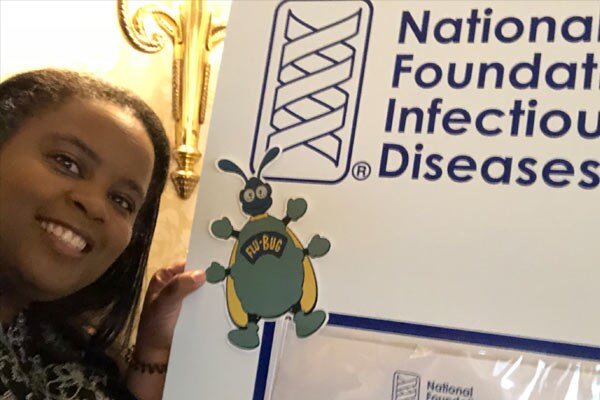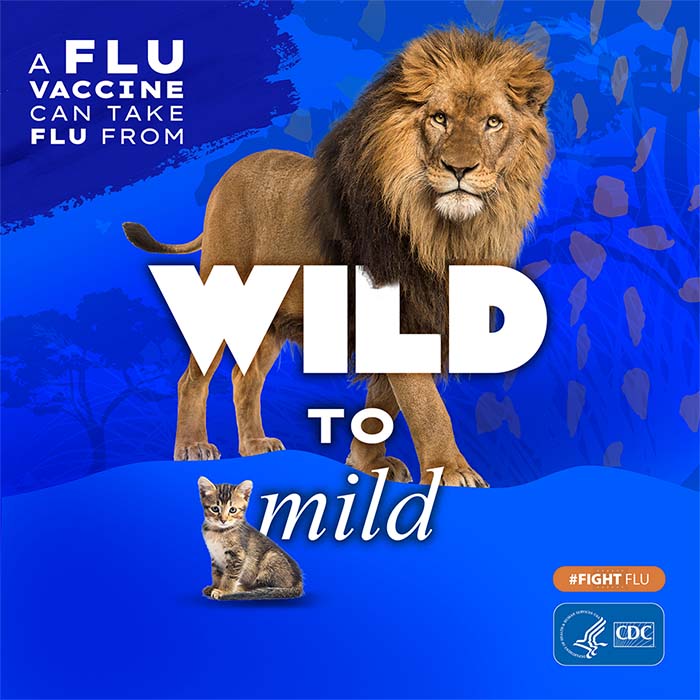Flu Fighter: Margot Savoy
Meet flu fighter Dr. Margot Savoy, professor and chair of the Department of Family and Community Medicine at the Lewis Katz School of Medicine at Temple University. She is a leader in the medical field, and has been recognized by several professional organizations for her work. Dr. Savoy works to make getting a flu vaccine an easy choice for all her patients, and finds joy in educating her community.
Name: Margot Savoy, MD, MPH
Title: Professor and chair of the Department of Family and Community Medicine at the Lewis Katz School of Medicine at Temple University
Location: Philadelphia, PA
- Can you share a few highlights of your experience in flu prevention? What is the most rewarding part of your work?As a family physician I have had many opportunities to promote flu prevention in my practice, around my community and at a national level. As an immunization leader for the American Academy of Family Physicians I’ve developed and promoted vaccine policies, advocated for immunization coverage, taught continuing medical education for family physicians and mentored practices through quality improvement to improve their vaccination rates.When you promote preventive services like vaccination sometimes the rewards are harder to see. You can’t see when the person doesn’t get sick. The moment I love to witness is the “a-ha!” moment. It’s when a patient I’ve been really worried about finally agrees to be vaccinated or witnessing a practice have a breakthrough figuring out exactly what their patients needed to overcome their immunization barriers.
- In your role, how do you fight flu?
I fight flu by
1.) Leading by example- I get my flu shot every year and so does my family.
2.) Stocking the vaccine in my office and making it easy to get vaccinated- My office vaccinates the whole family against influenza (and other vaccine preventable diseases). If you don’t happen to be seeing me today, we can still get you vaccinated today through our MA/nurse visit schedule.
3.) Making a strong recommendation- I recommend everyone 6 months and older be immunized against influenza every year.
4.) Educating my community- There is a lot of misinformation out in the world about immunizations. During office visits I listen to patient concerns and share what information I have, but I don’t stop there. You can find me on social media sharing tips and helping my friends/family know more about the value of vaccines. I also love being in the community for health fairs and workshops! It’s wonderful to have extra time and a larger group to chat together about the importance of hand hygiene, what to do if you are infected with influenza and sharing how influenza impacts people with chronic diseases. It’s important to me that my community makes informed decisions about influenza vaccination based on accurate information. I also work to make sure my physician community is educated and up to date through learning opportunities like newsletters, articles, presentations and social media. - What is the most difficult part of flu prevention? Helping patients understand that influenza is a deadly disease and they are putting themselves and their loved ones at risk by choosing to take their chances. It is exhausting some days to have to constantly struggle helping patients choose prevention, but once you have seen someone die of influenza, it’s hard to let my people go unprotected.
- How do you discuss flu vaccination with your patients?The conversation starts with rooming- the medical assistants and nurses have standing orders and can provide flu vaccine before I even see the patient. For those waiting to discuss vaccination with me, I start with my recommendation- You are due for a flu vaccine. We have them here today. Can I get one for you? If there are any worries or questions, we talk about them openly and honestly. If in the end you decide to decline, I make myself a note to ask you again and let you know you are welcome to return if you change your mind (You don’t even have to see me- just walk in and we’ll take care of it for you!) If you agree to be vaccinated I say THANK YOU!
- What would you say to those who are hesitant about getting a flu vaccine? The most common concern I hear from patients is that the flu shot makes them sick. I get where they are coming from. My immune system gets a little excited when I get vaccinated too so I often feel a little under the weather the day or so after my vaccination. I also share with them my own experience with influenza and how different the actual infection is compared to the immune response after vaccination. The one time I actually got flu (in college and before I started getting flu shots regularly) I swear I thought I was going to never move again- even my hair hurt! I don’t ever want to feel that sick again, and I don’t want them to ever experience that either. Also, my patients are part of my family now and it would truly hurt me to know I could have prevented them being hospitalized or dying because I didn’t give them a simple vaccine.
- What advice would you give to other health care professionals (HCPs) to improve their flu vaccination rates?– Use the known best practices: Stock vaccine. Use standing orders. Offer immunization walk-in clinics. Promote the vaccine on your phone message, website and in the waiting room. Send reminder messages.
– Plant seeds: Don’t wait until October to start talking about influenza. During the routine visits in the summer use anticipatory guidance to give patients a heads up that when you see them next it will be time for their flu vaccine. (While you are at it, double check their pneumonia and Tdap vaccine status then too.)
– Pay attention to the patients with chronic diseases: They often have a lot going on to cover in 15 minutes, but these are the patients who need influenza (and other vaccines) the most. If they get sick their chance of being hospitalized or dying is significantly higher.
– Respect the patient’s concerns and leave the door open for them to change their minds: Not every patient is going to agree to be immunized. I know that is hard for us to see people taking unnecessary risks for a disease that we know can be devastating. Don’t get discouraged or angry. Thank the patient for sharing their concerns with you. Offer information for them to take home. Most importantly, offer them the opportunity to come back. Many patients who initially told me no have returned to be vaccinated once they had time to think about it more. Also, I document our conversation in my note so I can pick up where we left off when I see them next. There is a reason marketing folks show you the same commercial 10 times in an hour! If at first I don’t succeed I try again next visit.



